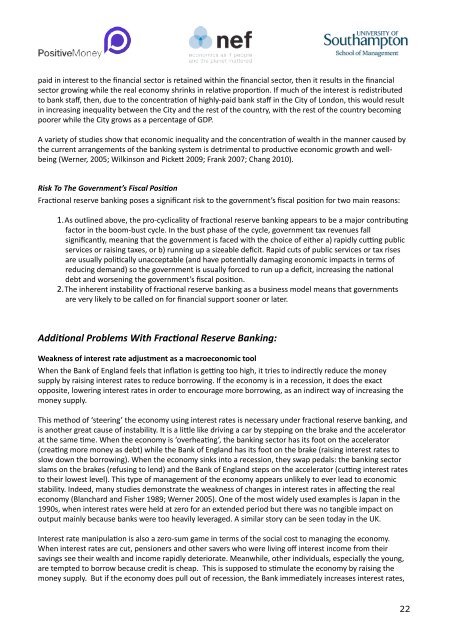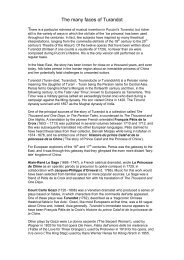NEF-Southampton-Positive-Money-ICB-Submission
NEF-Southampton-Positive-Money-ICB-Submission
NEF-Southampton-Positive-Money-ICB-Submission
Create successful ePaper yourself
Turn your PDF publications into a flip-book with our unique Google optimized e-Paper software.
paid in interest to the financial sector is retained within the financial sector, then it results in the financial<br />
sector growing while the real economy shrinks in relaGve proporGon. If much of the interest is redistributed<br />
to bank staff, then, due to the concentraGon of highly-‐paid bank staff in the City of London, this would result<br />
in increasing inequality between the City and the rest of the country, with the rest of the country becoming<br />
poorer while the City grows as a percentage of GDP.<br />
A variety of studies show that economic inequality and the concentraGon of wealth in the manner caused by<br />
the current arrangements of the banking system is detrimental to producGve economic growth and well-‐<br />
being (Werner, 2005; Wilkinson and PickeO 2009; Frank 2007; Chang 2010).<br />
Risk To The Government’s Fiscal PosiDon<br />
FracGonal reserve banking poses a significant risk to the government’s fiscal posiGon for two main reasons:<br />
1.As outlined above, the pro-‐cyclicality of fracGonal reserve banking appears to be a major contribuGng<br />
factor in the boom-‐bust cycle. In the bust phase of the cycle, government tax revenues fall<br />
significantly, meaning that the government is faced with the choice of either a) rapidly cuung public<br />
services or raising taxes, or b) running up a sizeable deficit. Rapid cuts of public services or tax rises<br />
are usually poliGcally unacceptable (and have potenGally damaging economic impacts in terms of<br />
reducing demand) so the government is usually forced to run up a deficit, increasing the naGonal<br />
debt and worsening the government’s fiscal posiGon.<br />
2.The inherent instability of fracGonal reserve banking as a business model means that governments<br />
are very likely to be called on for financial support sooner or later.<br />
AddiDonal Problems With FracDonal Reserve Banking:<br />
Weakness of interest rate adjustment as a macroeconomic tool<br />
When the Bank of England feels that inflaGon is geung too high, it tries to indirectly reduce the money<br />
supply by raising interest rates to reduce borrowing. If the economy is in a recession, it does the exact<br />
opposite, lowering interest rates in order to encourage more borrowing, as an indirect way of increasing the<br />
money supply.<br />
This method of ‘steering’ the economy using interest rates is necessary under fracGonal reserve banking, and<br />
is another great cause of instability. It is a liOle like driving a car by stepping on the brake and the accelerator<br />
at the same Gme. When the economy is ‘overheaGng’, the banking sector has its foot on the accelerator<br />
(creaGng more money as debt) while the Bank of England has its foot on the brake (raising interest rates to<br />
slow down the borrowing). When the economy sinks into a recession, they swap pedals: the banking sector<br />
slams on the brakes (refusing to lend) and the Bank of England steps on the accelerator (cuung interest rates<br />
to their lowest level). This type of management of the economy appears unlikely to ever lead to economic<br />
stability. Indeed, many studies demonstrate the weakness of changes in interest rates in affecGng the real<br />
economy (Blanchard and Fisher 1989; Werner 2005). One of the most widely used examples is Japan in the<br />
1990s, when interest rates were held at zero for an extended period but there was no tangible impact on<br />
output mainly because banks were too heavily leveraged. A similar story can be seen today in the UK.<br />
Interest rate manipulaGon is also a zero-‐sum game in terms of the social cost to managing the economy.<br />
When interest rates are cut, pensioners and other savers who were living off interest income from their<br />
savings see their wealth and income rapidly deteriorate. Meanwhile, other individuals, especially the young,<br />
are tempted to borrow because credit is cheap. This is supposed to sGmulate the economy by raising the<br />
money supply. But if the economy does pull out of recession, the Bank immediately increases interest rates,<br />
22



